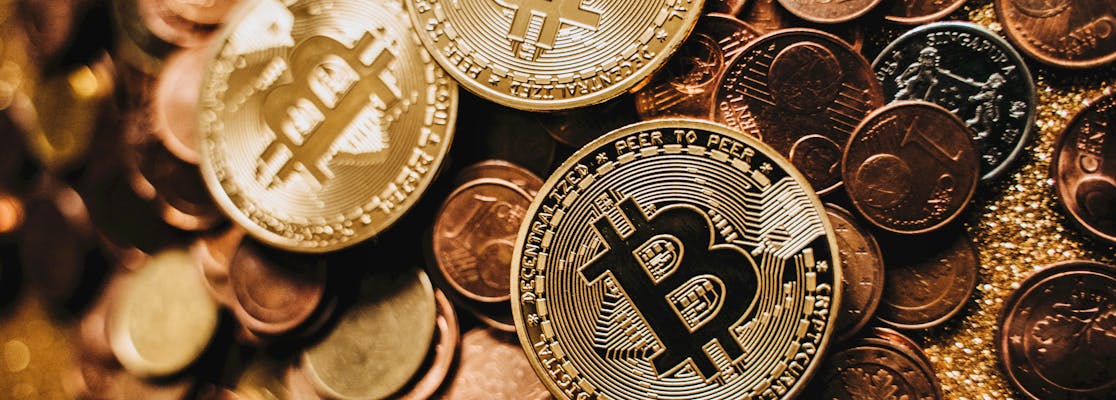Should I Buy Bitcoin?
All products and services featured are independently selected by WikiJob. When you register or purchase through links on this page, we may earn a commission.
Don’t invest unless you’re prepared to lose all the money you invest. This is a high-risk investment and you should not expect to be protected if something goes wrong. Take 2 mins to learn more at https://etoro.tw/44JRWLY.
What Is Bitcoin?
Cryptocurrency is a term used to describe digital currency, and the most famous is Bitcoin.
It was created in 2009 by the pseudonymous Satoshi Nakamoto, who also produced a white paper alongside this decentralized cash, which described it as a new way of financial thinking, moving away from reliance on governments and traditional banking systems.
Bitcoin was designed in response to the way governments dealt with the worldwide financial crash – by printing more money.
There wasn’t much uptake to begin with, and many early coins were practically given away through Bitcoin faucets and as rewards for online tasks that helped validate transactions and create coins (known as mining).
Although the balances of Bitcoin are held on a public ledger, there are no physical entities that can be bought or sold – and the decentralized nature of cryptocurrencies in general make them mostly anonymous in terms of buying, trading and spending.
Bitcoin, and other cryptocurrencies, can be used for various things, from investment opportunities to paying for goods and services.
The supporters of digital currency passionately believe it is the future of finance, with the technology behind it – the blockchain – at the heart of growing and developing computing power, specialized applications and global software.
Is Bitcoin a Safe Investment?
All digital currency is developmental and new, so it could be considered a risky investment.
The specific risks associated with Bitcoin are the same as with other altcoins or cryptocurrencies:
- No guaranteed value
- Speculative investors
- No long-term pricing history
- No uniform regulation
However, it is an interesting way to invest money, diversify a portfolio or get involved in new technology.
Deciding whether you should invest in Bitcoin is a personal decision, but there are a few things you can think about to help you decide.
Reasons to Buy or Invest in Bitcoin
You Want to Use Bitcoin as a Currency
As cryptocurrency becomes more mainstream, there are a lot more ways to spend your bitcoin – and buying it to use instead of fiat currency might have hidden benefits.
As Bitcoin popularity grows, you can use cryptocurrency to make purchases online and in some brick-and-mortar stores. Some places might encourage the use of Bitcoin by offering discounts if you make a purchase in cryptocurrency.
The increasing value of altcoins can make your purchase worth more in Bitcoin than in fiat. If you spend $100 on 100 altcoins, and a week later those 100 coins are worth $150, it makes sense to use the coins for a transaction.
With the fluctuating costs of sending money abroad, the simple transaction rates of Bitcoin can make it more cost effective when you want to make foreign payments.
You Have Money to Invest (That You Can Afford to Lose)
Bitcoin is a fun, exciting and novel trading instrument – so, if you can afford to invest, it might be a good way to get involved.
As with investing of any type, buying and selling bitcoin can be risky, but after you have made sure that your budget has money to spare – and you don’t mind the risk – you can ensure that you aren’t missing out on the next big thing and become a relatively early adopter.
Fear of missing out is a powerful motivator for many people who are increasing their investment portfolios through cryptocurrency, weighing up the potential losses against the projected growth of the instrument.
Bitcoin Is Independent to Other Markets and Not Like Fiat Currency
Bitcoin is based on a decentralized system, not reliant on any government, financial institution or mainstream system.
The independence of bitcoin means that it is not tied to the action of the stock market. It doesn’t become subject to the same patterns of inflation or devaluation. It cannot be printed – or controlled and frozen – by any government or agency.
Cryptocurrency Is Still the Best Performing Asset
Despite the turbulent history of Bitcoin, cryptocurrency is still the best performing asset. In 2021 alone, Bitcoin value grew by 60%, despite the market volatility caused by the pandemic.
This performance has come from many sources.
The mainstream media has highlighted Bitcoin on many occasions, bringing new investors who are interested in the blockchain technology and the futuristic ideals of cryptocurrency.
This has been amplified by well-known public figures like Elon Musk seemingly getting behind the revolution, and businesses like Tesla and MicroStrategy purchasing Bitcoin for their own holdings.

Reasons Not to Buy or Invest in Bitcoin
You Are Wary of Volatile Investments
Risk is almost unavoidable if you want to make money through trading or investments, but the risk profile of Bitcoin might make you wary.
Even on a daily basis, Bitcoin can gain and lose thousands in value, depending on what has been reported in the news and even through posts on social media.
In March 2020, Bitcoin lost 50% of its value in just one day – so for those who are risk averse, Bitcoin could be a step too far.
Security
There are a few considerations that might be important to investors when it comes to security.
While the blockchain is notoriously hard for bad actors (cybercriminals) to crack, individual wallets, especially those held on cryptocurrency exchanges, are considered more vulnerable to hackers.
Digital wallets have a public key – much like a bank account number – that are used to send and receive bitcoin, but they also have a private key. This private key is like a PIN for an account, and if a hacker gains access, they can clear your holdings at the push of a button.
Another risk relating to security is the growing concern of criminal enterprises making use of altcoins.
This can take the form of underground market payments, funding for terrorist organizations or even money laundering – and the decentralized nature of the system is designed for anonymity, which makes it difficult to trace and monitor.
Bitcoin Payments Not Widely Accepted
Although the number of retailers and places you can spend cryptocurrency is increasing, we are a way off from paying for groceries and our daily life using bitcoin.
This might make it less appealing for those who are looking for an alternative payment system for everyday transactions.
Tax Implications
In 2014, the IRS decided that all digital and virtual currencies should be considered as property for tax calculations, rather than as currency.
This means that any bitcoin held as capital is subject to capital gains and capital losses in your tax return, and any sale or use of bitcoin can be taxed.
These tax implications can make investing complicated.
No Tangible Asset
The worth of Bitcoin, like other cryptocurrencies, depends on how much people are willing to pay for it. This means that the value is tied to the emotions of investors and how excited they are about the new, shiny cryptocurrency.
The ‘next big thing’ has historically been a risky investment, whether that is software, computing or even Beanie Babies. The bubble eventually bursts, and investors will lose money, regardless of whether the technology survives.
Despite the bullish movement of Bitcoin – and the meteoric rise in value – that level of growth has been proven to be unsustainable in other industries and with other assets.
How to Decide if Bitcoin Is Right for You
When it comes to deciding if Bitcoin is for you, the most important factor in your decision is likely to be the risk.
When you are looking at the amount you want to invest, in any market, it would be unwise to bet more than you can afford.
This is more important with the highly volatile nature of Bitcoin.
Just a snapshot of the Bitcoin pricing history can demonstrate the risk – and why people are taking that risk.
In April 2011, one bitcoin was worth one dollar. By June of the same year, the value rose to $32. Then, by November 2011, the price had bottomed out at $2.
Of course, in the early part of 2020 and into 2021, thanks to the pandemic shutdown and associated financial issues, the interest in cryptocurrency spiked, and the Bitcoin price grew more and more, hitting a record high of more than $68,000 per coin in November 2021.
This is where measuring the risk becomes especially important. If you had bought just one Bitcoin back when it cost a fraction of a dollar, your portfolio would have been extremely healthy.
But get in the game now, when the cost is so much higher, and you risk being caught in the inevitable downward swing when the trend turns bearish.
What Situations Might Make Buying or Investing in Bitcoin Appropriate?
With the growth of Bitcoin as an accepted form of payment in a number of situations, buying cryptocurrency is becoming more socially accepted. It is something that can be achieved by non-investors, thanks to the huge number of brokers and cryptocurrency exchanges that exist.
Of course, those who are looking to add different risk profiles to their investment portfolio are also choosing Bitcoin because the upward trend of the market seems to suggest that the volatility risk is definitely worth the reward.
It is worth considering that there are other cryptocurrency options out there. They might not be as well known, but with upwards of 10,000 options to choose from, there should be something available that you might be interested in.
Cryptocurrency can refer to coins or to tokens. Tokens are often created for use with a specific blockchain or network – Binance Coin (BNB), for example, was designed to offer a way for the Binance exchange to make money, while customers who held BNB were able to get discounts on trading costs.
Ethereum is a really important blockchain. It works on the development of decentralized apps and smart contracts, so the ether token was made to be used when navigating Ethereum.
If you would like to get involved with decentralized blockchain technology, you might be better off investing in ether – it is traded in exactly the same way as other altcoins.
If you are looking to make an investment, getting involved in Bitcoin now might be too much of a risk. With so many other options to choose from, you can take your pick.
With the newer altcoins, there might be less pricing history to help with your analysis, but the sustained interest in cryptocurrency means that any digital currency could become the next big thing and amp up in price, making this the perfect time to get involved.
For those who are looking to support blockchain technology and enjoy the disruptive nature of the cryptocurrency world, looking for a truly untraceable altcoin might be preferable.
Although designed to be anonymous, many of the exchanges that deal with Bitcoin have to comply with certain anti-money laundering regulations, including Know Your Customer – which means they hold client details. There are ways around this, and one option is to invest in Monero.
Monero is an open-source, community-driven cryptocurrency that was developed using donations, and thanks to the exceptional security from ring signatures, it has the best privacy options.
While this is ‘geek central’ for cryptographers, it is also perfect for criminals – but can help support dissidents in oppressive regimes to protect their finances.
Bitcoin is not the only option for investment, whether you are looking to trade, hold or make purchases.
Final Thoughts
Investing in Bitcoin can be a risky business, and understanding that the volatile nature of cryptocurrency is based on the news and even social media will help you decide if you want to take that risk.
Should you invest in Bitcoin, you have the opportunity to be involved in what seems to be the future of global connections – the blockchain – while making money.
Bitcoin, along with other digital currency, is becoming more mainstream. You can buy a variety of things using bitcoin, including luxury cars, yachts, watches, coffee and pizza, making it fairly accessible for the more casual investor.
Although it might seem that the Bitcoin bubble is about to burst, the reality is that it is almost impossible to predict where it will be tomorrow, let alone in the long term – and that is the risk that you have to balance before you invest.
WikiJob does not provide tax, investment or financial services and advice. The information is being presented without consideration of the investment objectives, risk tolerance or financial circumstances of any specific investor and might not be suitable for all investors. Past performance is not indicative of future results. Investing involves risk including the possible loss of principal.
Don’t invest unless you’re prepared to lose all the money you invest. This is a high-risk investment and you should not expect to be protected if something goes wrong. Take 2 mins to learn more at https://etoro.tw/44JRWLY.





![4 Best Bitcoin Wallets (UK & Worldwide) of 2026 [Compared & Reviewed]](https://www.datocms-assets.com/7756/1602258865-untitled-design-86.png?auto=compress%2C%20format%2C%20enhance%2Cformat&dpr=0.07&fit=crop&w=3360)
